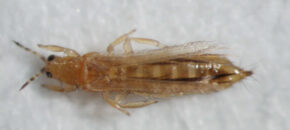Strawberry leaf spot, caused by the soil-borne fungal pathogen, Mycosphaerella fragariae, can infect leaves, petioles, runners, fruit stalks (pedicels), and berry caps or calyxes. Small, dark purple to reddish-purple, round spots, 1/8 to 1/4 inch in diameter (3 to 6 millimeters), appear on the upper leaf surfaces. The center of the spots soon become tan or […]
Continue reading...Vegetable Disease Update: 07-08-23
Cucurbit downy mildew has been reported on cucumber and cantaloupe in southern New Jersey. For more information on CDM control please click here. Blackleg has been reported on potato in New Jersey. There have been no reports of Late blight in potato or tomato in the region to date. To follow the progress of Late blight […]
Continue reading...Cucurbit Downy Mildew Alert – Cantaloupe – 7/8/23
Cucurbit downy mildew has been confirmed on cantaloupe in Salem County on July 7th and on cucumber in Gloucester County (7/1) and in Atlantic County (6/13) in southern New Jersey. This is the third report of CDM in the state and region this growing season. All cucumber and cantaloupe growers should scout on a daily […]
Continue reading...Identifying and controlling Botrytis in high tunnel and greenhouse tomato production
Botrytis, or gray mold, caused by the fungus, Botrytis cinerea, can cause significant losses in high tunnel and greenhouse tomato production if not controlled properly. The pathogen can rapidly spread during periods when structures are closed and when relative humidity remains high for long periods of time. This often occurs when outside weather remains cool […]
Continue reading...Monitor for Thrips in Vegetable Crops

Now that spring grains like wheat and rye have dried down and are being combined, thrips in those fields will move to vegetable crops, especially when small grains are adjacent to vegetable fields. Thrips are very small and often missed if casually looking at a plant since they hide in blossoms, under sepals, on under […]
Continue reading...Identifying and controlling leaf mold in high tunnel & greenhouse tomato production
Leaf mold occasionally appears in high tunnel or greenhouse tomato production in New Jersey. However, under ideal conditions the disease will develop in field-grown crops. The fungus will cause infection under prolonged periods leaf wetness and when relative humidity remains above 85%. If relative humidity is below 85% the disease will not occur. Therefore, the […]
Continue reading...